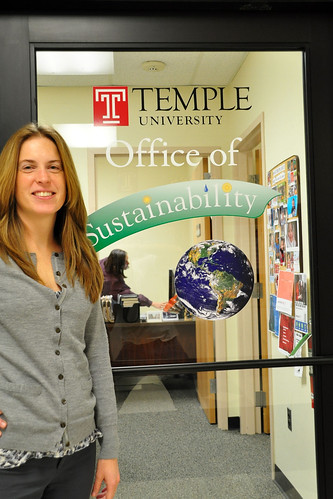
Zimride strives to slash single occupancy vehicles and adopts a green initiative.
The Office of Sustainability is driving a hard launch of Temple Zimride, a car share program started in April in an effort to cut down the university’s carbon footprint.
“This is our big push,” said Kathleen Grady, sustainability coordinator for the Office of Sustainability. “We want to get more users because the more people who are on there, the easier it is for people to get matches. Our goal is to have 700 [users] by May.”
Since April, the program has generated a user base of 429 members, comprised of students, faculty and staff, but the Office of Sustainability aims to increase ridership during the holidays.
The program helps to cut the use of single occupancy vehicles, Grady said. It also takes cars off the road altogether, which is especially impactful during the heavily traveled holiday season.
If all rides posted through Temple Zimride since April had been taken, between 36,945 and 110,836 miles and between 1,448 to 4,336 gallons of gas would have been saved, according to the Zimride website.
Amelia Garrett, a junior economics and environmental science major and Students for Environmental Action president, said the program makes sense not only for the environmental implications but also logistically for holiday travel.
“Those who don’t have the option to take public transit can catch a ride with someone else and still not have to have their parents come take them home,” Garrett said. “It’s really an awesome option.”
While the program is widely used for weekly commute rides around the city, one-time rides to further destinations exist as well.
Of the 454 requested rides posted since April, 97 have been for distances of five miles or less, 249 for 15 miles or less and 369 for 100 miles or less, while 11 have been for drives more than 360 miles.
Tired of wasting time, energy and money, senior biology major Steven Lach wanted to break his yearly routine of driving home to Allentown alone for the holidays, he said. Lach learned about Temple Zimride through an email blast and, after slight apprehension, decided to join.
“It’s a nice way to humanize driving,” Lach said. “Everyone’s in their own little world in their cars and it’s just a nice way to meet some new people, decrease traffic hopefully and take one more car off the road.”
Participants create a profile on the Temple Zimride website in order to be geographically matched with similar commuters.
“You can give as much information as you want,” Grady said. “You can list anything from hating listening to country music in the car to how much money you want to get or give for a ride. It’s similar to setting up a Facebook profile.”
Once matched, the user chooses the best-fitting fellow commuter and messages that person.
But some are hesitant to get involved with a program like Zimride because they do not feel safe. To eradicate this hesitation, Temple Zimride is a closed network with services available to only the Temple community. Users can also rate their ride, another method used to maintain accountability in the program.
“It’s an interesting way to further develop the relationship between students, faculty and staff,” Grady said. “It’s kind of cool because you get to know your faculty and staff members on a different level.”
Of the 429 users registered to the Temple Zimride website, 120 are registered as undergraduate students, 32 as graduate students, 28 as faculty/staff, three alumni and 246 did not specify their statuses.
Research at the American College and University Presidents’ Climate Commitment reports higher education represents 2 percent to 3 percent of the country’s carbon footprint. Transportation is an important factor in this, especially at large universities like Temple, which has a student body of more than 37,000.
“We have access to [students] to work on changing some of their behavior,” Grady said. “If we make this big of an impact, then it’s a sizable mass…if all of the universities come together we can make a huge impact on reducing our contribution to climate change.”
“I work at a green building company and most universities are making sustainable movements because not only are they educators and it should be in their nature to push for this sustainable system, but [the systems] have such a big impact,” Lach said.
The Office of Sustainability pays for the Zimride software and charges no service fees as a way to keep the program as accessible as possible, Grady said. Commuters are responsible only for negotiating a price between driver and passenger. The requested prices go up to $22 per ride, on the website.
Garrett will continue to encourage the use of car share programs like Temple Zimride because she said it is important that the youth are aware of how they can lessen environmental detriment.
“We’re the ones who are going to be directly affected by climate change in the future,” Garrett said. “We also are the ones who are going to be making decisions about how to reduce carbon emissions. It’s really up to us so it’s important we know what we can do to stop it.”
Becky Kerner can be reached at becky.kerner@temple.edu.



Be the first to comment